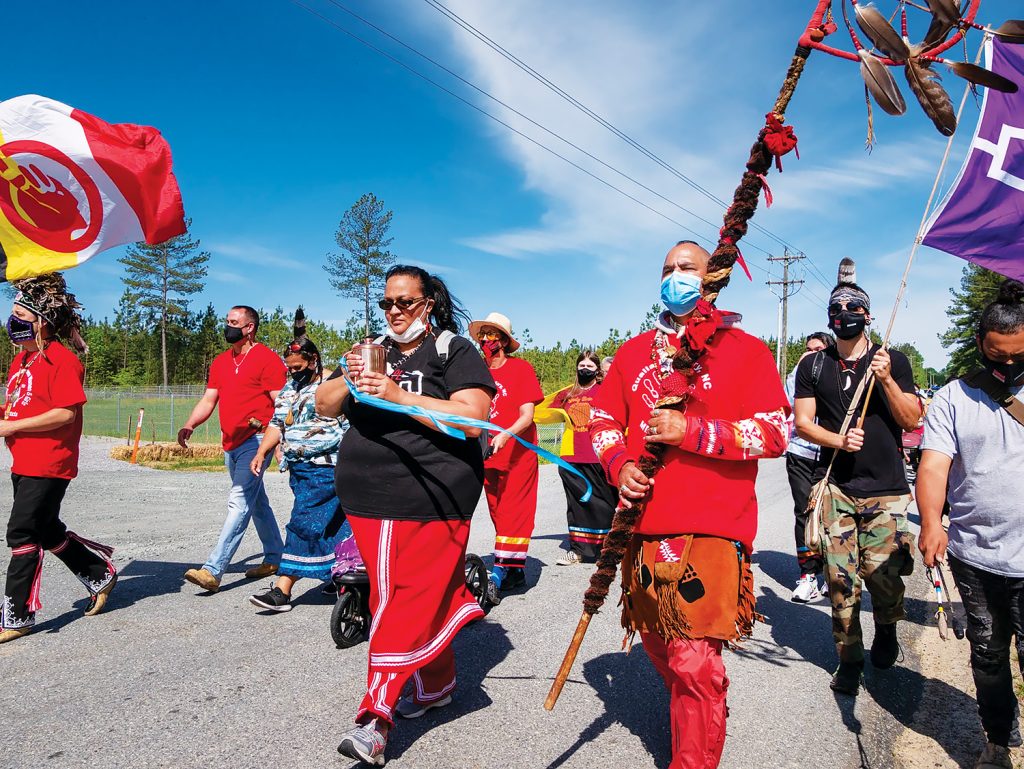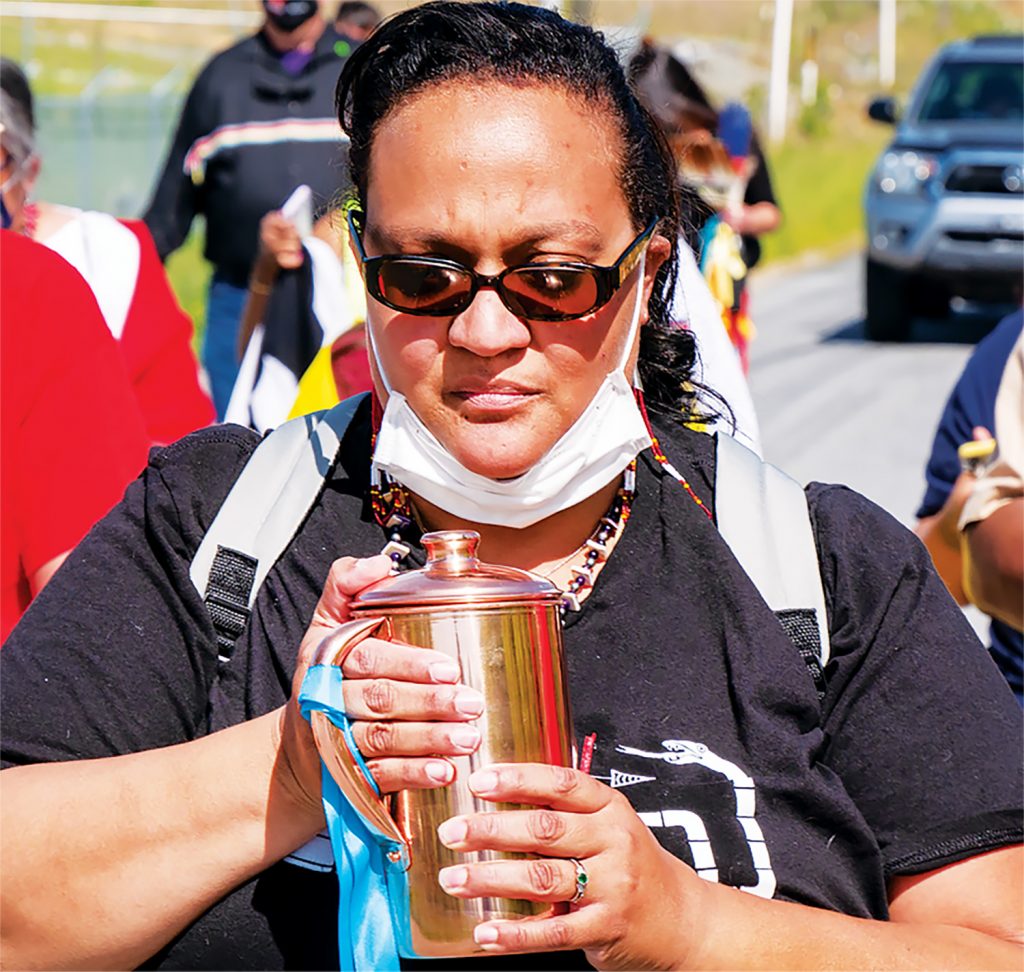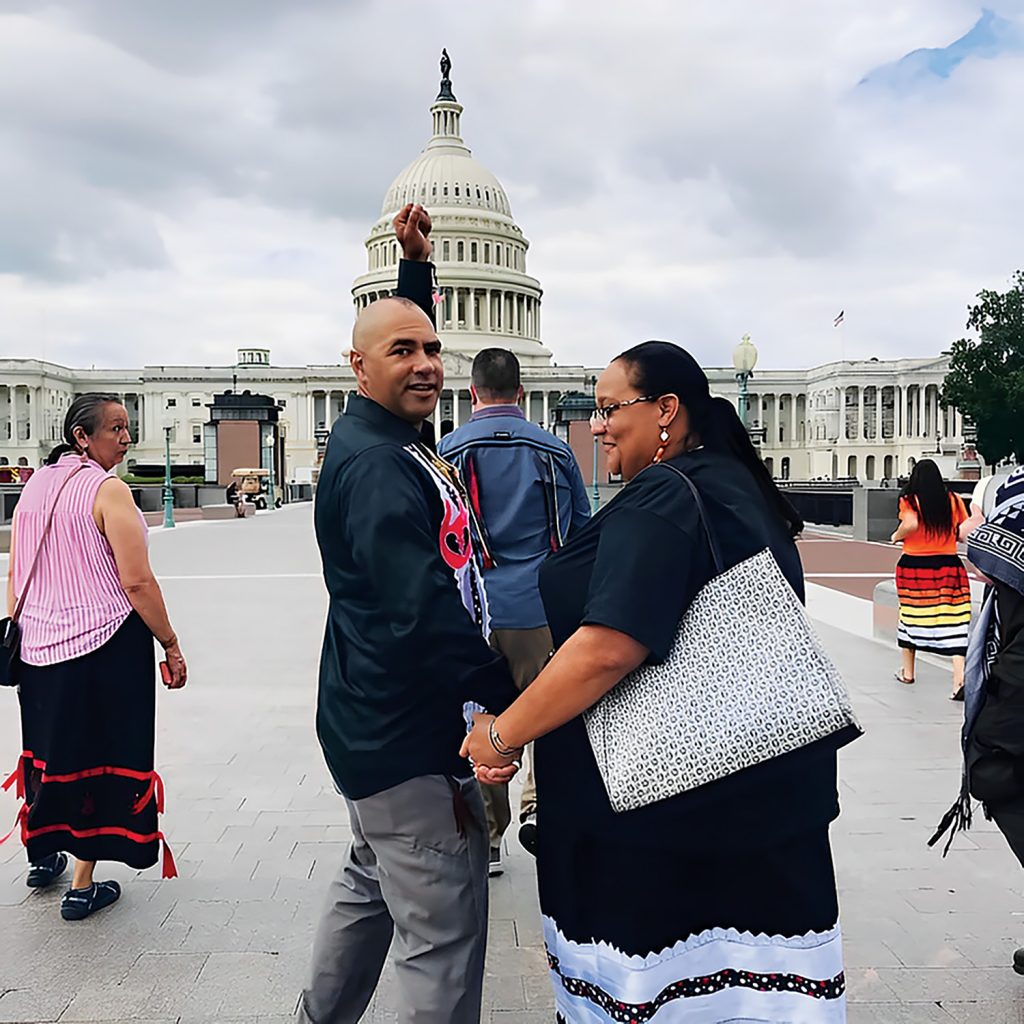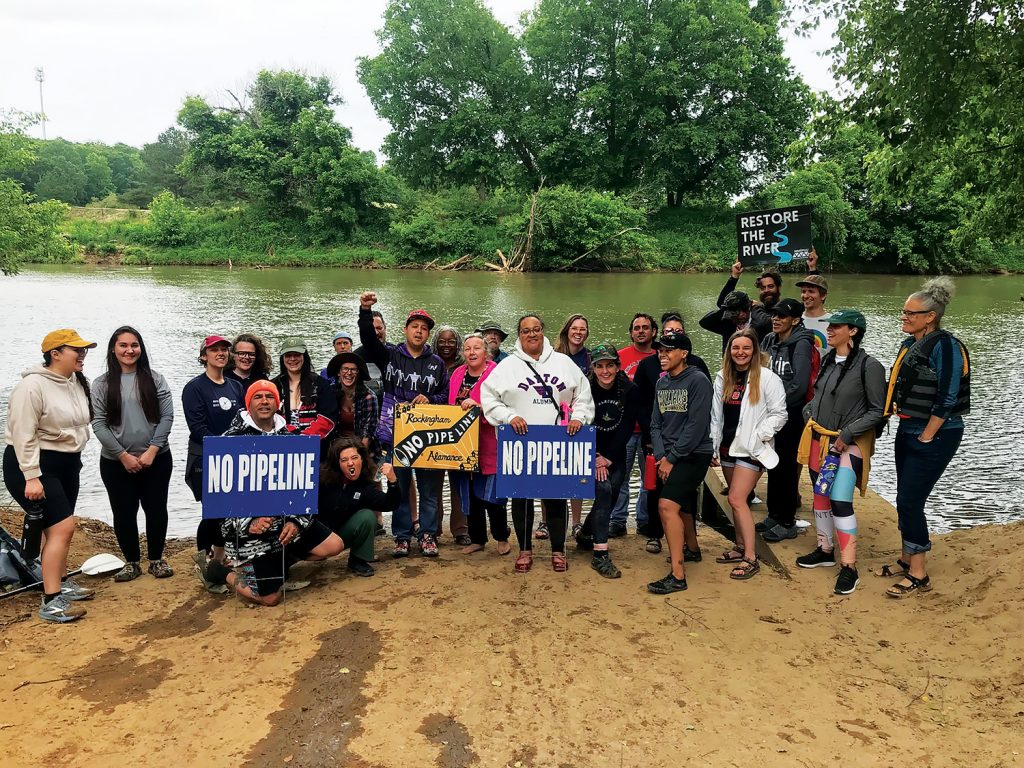Lorelei Goff | August 3, 2023 | 3 Comments

Crystal Cavalier-Keck (front left) and Jason Crazy Bear Keck (front right) march in the May 2021 Stop MVP Water Walk in the Haw River watershed. The couple fights the Mountain Valley Pipeline, MVP Southgate and the crisis of missing and murdered Indigenous women and girls,while promoting the Rights of Nature movement and Indigenous cultural values through their nonprofit organization, 7 Directions of Service. Photo by Myles Green
By Lorelei Goff
The morning Dr. Crystal Cavalier-Keck witnessed a woman escape from human traffickers changed both their lives.
The woman, one of hundreds of victims of labor and sex traffickers each year in North Carolina, managed to break free from her captors and run, screaming. Her kidnappers fled when she reached the safety of a convenience store.
“It really got me thinking,” says Cavalier-Keck, a member of the Occaneechi Band of the Saponi Nation.
When Cavalier-Keck and her husband, Jason Crazy Bear Keck of the Louisiana Bands of Choctaw, traveled from their home in North Carolina to Washington, D.C., for an Indigenous peoples march, she heard people talking about missing and murdered Indigenous women.
That prompted Cavalier-Keck to investigate the scope of the problem within Indigenous communities. Her research, however, soon hit a wall.
“I found out that the police don’t track data for American Indians,” she says.
Organizing for Action
Cavalier-Keck, whose blend of ethnicities also includes African American and Scottish, was compelled to complete her doctorate focused on the crisis of missing and murdered Indigenous women. It also led her to found the Missing Murdered Indigenous Women Coalition of North Carolina.
Through their nonprofit, 7 Directions of Service, Cavalier-Keck and her husband tackle the problem of violence against Indigenous women, the Southgate extension of the Mountain Valley Pipeline and the Mountain Valley Pipeline mainline. They originally formed the nonprofit in 2021 to offer cultural education for young Indigenous people. The organization is now staffed by four part-time employees and more than 40 volunteers.
Now the organization also works to promote the Rights of Nature movement, which seeks to give similar legal rights to the land as to people.

Crystal Cavalier-Keck carries a vessel of water during the Stop MVP Water Walk in the Haw River watershed in May of 2021. Photo by Myles Green
The principles that govern the Kecks’ work and that of 7 Directions of Service come from the Indigenous concept of honoring the seven directions.
“These teachings have a multitude of interpretations across Indigenous cultures,” the organization’s website explains. “For us, they proclaim the sanctity and vitality of each direction: children, women, men, elders, the earth, the sky — which is also symbolic of culture and the mind — and finally, the direction within.”
One effort underway to raise awareness of missing and murdered Indigenous women involves a ceremony where survivors and victims’ families make red hand prints on a canvas teepee with the intention of releasing their feelings. When the paint dries, they write their name or their missing family member’s name in the hand print. A red hand, often depicted over the mouth, has become the symbol for missing and murdered Indigenous women whose voices are not heard.
The group plans to place the teepees in prominent public places and, they hope, on the lawn of the White House.
“We feel this is a visibility issue, and you can’t really miss a 10-foot teepee with handprints on it,” she says.
Additionally, they’ve created a database to understand how many Indigenous women have been kidnapped and murdered in North Carolina. The numbers have been under-reported, she says, due to inconsistency in law enforcement reporting.
Cavalier-Keck says if tribes gain state recognition, it will also help victims by increasing the visibility of Indigenous communities and giving authorities a box to check off when documenting the crimes. Most of the time, Cavalier-Keck believes, law enforcement designates Indigenous people as Black or White according to the whim of the officer filling out the paperwork.
Fighting for People over Pipelines
The Mountain Valley Pipeline, a 303-mile fracked gas pipeline first announced in 2014, runs through parts of Virginia and West Virginia. The project recently received permission to resume construction. However, at press time, a federal court had issued a new stay order that once more prevented construction along the route.
The MVP Southgate extension would reach 70 miles into North Carolina, onto Monacan and Saponi lands, and requires the construction of a compressor station in a predominantly Black Community near Chatham, Virginia.
Cavalier-Keck points out that communities of color and economically challenged or distressed areas are often targeted by pipeline companies because they lack the social, financial and political power to fight back.
“It’d be something different if we were using it to warm our homes, but they were totally going to take our land and make us pay taxes on the easement,” Cavalier-Keck says.
The efforts by 7 Directions to stop the pipeline have included organizing awareness-raising events such as picnics and paddles, speaking out in public forums, supporting technical comments, and lobbying lawmakers and government agencies.
The fight took the couple to Washington, D.C., in September 2022 to protest the pipeline and lobby Congress to vote against legislation that would give the Mountain Valley Pipeline special exemptions from environmental law and court review of its permits.

Jason Crazy Bear Keck and Dr. Crystal Cavalier-Keck of 7 Directions of Service traveled to Washington, D.C. in 2019 for an Indigenous People’s March. Photo by Kasey Kinsella
The rally, which attracted about 700 other concerned attendees, was also organized by Appalachian Voices, the organization that publishes The Appalachian Voice, People Versus Fossil Fuels and the Protect Our Water, Heritage, Rights coalition.
Pipeline fighters defeated this legislation multiple times in 2022 before it became law in June 2023 as part of a bipartisan bill to avert defaulting on the national debt. 7 Directions was among the groups that returned to the capitol following the debt ceiling deal to protest outside the White House.
Taking up the MVP fight in 2018 meant Cavalier-Keck had to resign her elected position on her tribal council to avoid a conflict of interest and lost her job as a security analyst with Corning. That fight and her run for Congress in 2020 garnered retaliation.
“It did make me a target in the community because, you know, when you shake the trees or you rock the boat, people will tend to come after you, right? Because you’re messing with money,” Cavalier-Keck says.
During her campaign, she refused donations from corporations, something she believes worried political and corporate stakeholders.
Her husband agrees, saying, “Crystal said, ‘I’m not taking any corporate [donations], because I don’t want Toys R Us to have a say in what I decide. … I want to be beholden to the actual voter that gave me 20 bucks when they only had 50.’”
The backlash included derogatory comments about her ethnicity and graphic threats of violence on Cavalier-Keck’s online pages. They and other protesters also faced harassment on the train ride from D.C. back to their homes.
“They were taking videos of us,” Keck says. “And then they were trying to engage us in arguments [about the pipeline].”
“They were picking out some of the youth that came with us,” he says, pointing out that they were on the train two days after the protest event, none of the group had appeared in the media, and all were dressed in plain clothes that didn’t identify them with the protest. He believes the harassers were paid for by pipeline stakeholders.
“I said, ‘I believe you’re financed by the pipeline, and go back and tell your financiers that we’re all peaceful people. We don’t believe in violence. And we’re not biting.’”
Keck says the antagonists stayed on the train, harassing them until all of the group had disembarked at each of their stops.
The couple say other tactics to deter them have included infiltrating their circle to get information and attempting to disrupt their plans, and trying to discredit them through character defamation, bribery and attacks on their finances.
“It doesn’t deter me at all,” Cavalier-Keck says.
7 Directions of Service’s work to stop the Mountain Valley Pipeline moves forward. In June, pipeline developers filed a request with the Federal Energy Regulatory Commission to extend its certificate for MVP Southgate. As of press time in late July, 7 Directions of Service and other regional pipeline opponents were collecting comments calling on the Federal Energy Regulatory Commission to reject the extension and urging North Carolina Gov. Roy Cooper to also ask FERC to reject MVP Southgate’s request.

7 Directions of Service organized a May 2023 paddle trip on the Dan River to build community and talk about protecting waterways from the MVP Soutgate extension of the Mountain Valley Pipeline. Jason Crazy Bear Keck and Crystal Cavalier-Keck each hold blue signs and are surrounded by supporters. Photo by Myles Green
Defending Rights of Nature
7 Directions of Service also led an initiative to protect the Haw River in North Carolina. Cavalier-Keck coauthored North Carolina House Bill 795, the Rights of Nature/Rights of the Haw River, which seeks protection for the Haw River And communities around theHaw River watershed.
Rights of Nature laws recognize ecosystems as having legally enforceable rights to exist, flourish and be protected. They help prevent approval of environmentally damaging projects and give communities firmer footing for legal action to stop them.
In what they term a long haul effort to bring the Indigenous-led Rights of Nature Movement to the state, 7 Directions of Service is teaming up with several other organizations, Indigenous advocates, lawyers, lawmakers and residents. The group’s website describes the effort as “fostering a cultural shift towards Indigenous and Earth-honoring values.”
Although they tackle diverse issues, a common denominator that drives Keck and his wife in all their work is love for their family.
“Each one of our five kids represents — we don’t know the number of — grandkids, great-grandkids, great-great-grandkids, seven generations forward,” Keck says. “And so that is the motivation we have.”
“We have to just hold the faith that it won’t be as hard [for our children],” he adds. “We’ve got to believe that our life isn’t as hard as our ancestor’s life was, you know, when all the real nasty colonization and enslavement practices were happening. They made sacrifices so we can have it like this.”
Keck believes success is possible in each fight they’ve undertaken, and it depends on those who choose to get involved.
“If everybody just did a little bit, if everybody just paid that extra attention and when they saw a bill that was sideways, they took the time to call, email and write their representative … everybody can do it,” he says. “Even if it’s one phone call.”
Like this content? Subscribe to The Voice email digests
Loved and inspired by the piece about “Seven Directions of Service” Thanks for sharing the many good ideas found in this essay.
Did 7 Directions of Service ask for intervention by Amtrak onboard personnel, file a complaint with Amtrak over any failure by Staff to protect riders from harassment or request onboard Staff to contact police? Please advise if pursuing through my membership in Rail Passengers Assoc would be helpful. All the best!
Keep walking, talking and fighting Warrior style!